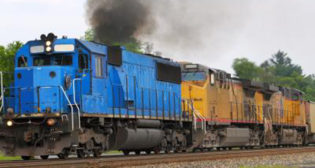
STB update: Waiting for Godot
Written by Frank N. Wilner, Capitol Hill Contributing EditorAs a perfect scene does not a great movie make, ideal legislation cannot deliver its intent absent proficient administration.
Although Senate Commerce Committee Chairman John Thune (R-S.D.) harvested bi-partisan support for the 2015 captive-shipper advocated Surface Transportation Board Reauthorization Act, a key element lies fallow—increasing the current three members to five to allow any two to exchange viewpoints prior to decision-making without violating government-in-sunshine rules.
The law demands more expeditious completion of pending proceedings, plus greater accountability, effectiveness, efficiency and transparency in adjudicating freight rate and service complaints, and crafting related methodologies. Yet 18 months since passage, with the new seats still vacant, stakeholders are experiencing a “waiting for Godot” with major rulemakings held in abeyance.
If funding was why, Thune solved the problem with a successful written plea to appropriators to boost the STB’s annual budget.
His more difficult challenge is to overcome political patronage that periodically catapults fakers and the marginally qualified into crucial regulatory posts. While Thune advocates White House nominations of genuinely qualified new STB members, there disturbingly lurks concern that President Trump will repay political debts with nominees beholden to special interests.
Thune, the third-highest-ranking Senate Republican and chair of the committee before which STB nominees must demonstrate their legitimacy, is a first line of defense. He said he expects “the first new appointments to the expanded Board will bring to the job a wealth of knowledge in railroad policy and economics along with a zeal for streamlining proceedings and proactive problem solving.”
Skeptics cite Thune’s recent camera-mugging with the railroads’ chief lobbyist before an AAR logo-adorned backdrop. Yet Thune also authored a letter to the STB rejecting a railroad attempt to interpret a provision of the reauthorization act (Section 16) as “requiring” the STB to use a rail-beneficial replacement-cost approach in assessing revenue adequacy—something the STB previously declined to do. Congress, said Thune, did not “require any change to the revenue adequacy determination framework.”
Although a small independent regulatory agency, the STB is crucial to resolving rail-customer grievances—especially as mergers have reduced the number of competing railroads to a handful, eliminating competitive choices for many shippers.
If, as the STB Reauthorization Act intends, there is to be greater accountability, effectiveness, efficiency and transparency, then superior leadership, beginning with an accomplished new chairman, who sets the agenda and initiates decisions, is paramount. A recent House Government Operations Subcommittee hearing revealed a troubling management culture under the chairmanship of Democrat Dan Elliott.
Although the STB’s current lone Republican, Ann Begeman—arguably one of the most qualified regulators in agency history—could have accepted the chairmanship upon Trump’s inauguration, she declined, agreeing to be the acting chairman pending arrival of at least one of the two new Republicans. During Elliott’s chairmanship, dating to 2009, she recorded the largest number of dissents from Elliott-initiated decisions in the 130-year history of the STB and its Interstate Commerce Commission predecessor. The second Democrat, Deb Miller, also has been sharply critical of Elliot’s actions.
The issues new members face beg for mature leadership qualities, plus validated skills in economics, finance and policy analysis.
Pending rulemakings have the potential to change substantially how shipper grievances are adjudicated and rates are negotiated. They include alternatives to determining maximum reasonable rates charged captive shippers, defining revenue adequacy that influences the level of new investment in plant and equipment, and standards under which railroads may impose fuel surcharges.
Also to be resolved is calculating the revenue and service impact of allowing sole-served shippers access, via mandatory switching, to a second railroad, including comparisons with Conrail Shared Assets and a similar requirement in Canada. Supporters of so-called competitive switching assert that communications firms, pipelines and electric utilities lost arguments, as made by railroads against such schemes, yet survived and prospered.
Profoundly, these are tasks for experts. Trump selects who approaches, but Thune commands the gate.



